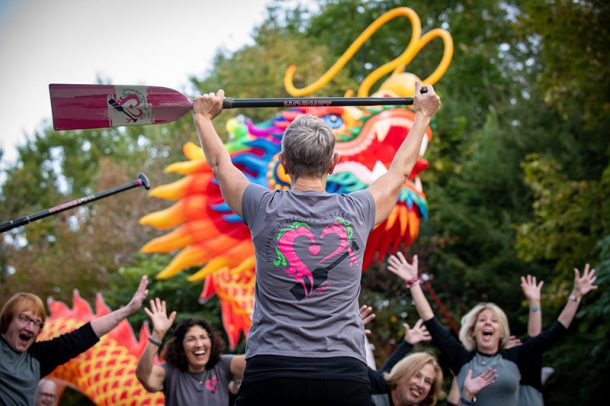
A dragon boat team consists of 20 paddlers sitting two abreast, a Cox who steers the dragon boat from the rear, and a drummer who sits at the front.
The team of paddlers work in unison to propel the boat forward from a standing start, the aim being to reach the finish line in the fastest time. Generally a race consists of between four and six boats.
Teams can be all men, all women, or a mixed crew with equal numbers of both men and women. Timing, strength, and endurance are three key elements of a successful team; the fourth and most critical, is teamwork. It is for this reason that the sport has achieved such a high profile around the world. Spectacular for both participants and spectators alike, Dragon Boating is the fastest growing aquatic sport in the world.
Adrenaline pumping and fiercely competitive, the teams range in experience from years to just a few weeks in some cases. Everyone is encouraged to “have a go” in this exciting sport that epitomizes a team spirit.
Origins of Dragon Boating
Dragon boating began in China more than 2000 years ago, originating from superstitious beliefs that the boat racing would ensure prosperous and bountiful crops.
The dragon boat celebrations were conducted during the summer solstice – the time of the year when natural calamities such as disease and death were more prevalent. Accordingly, Dragon Boating has come to symbolize both humankind’s struggle against nature and the fight against dangerous enemies.
The tradition of dragon boat racing was further embedded in Chinese culture by the tragedy of patriotic martyr Chu Yuan. Chu Yuan was a poet and a minister and council orto the King of Chu and lived during the “Warring States” period in Chinese history around the 4th century BC. It was a time when numerous supremacy wars were fought between feudal lords, resulting in the destruction of many kingdoms. The Kingdom of Chu, however, became one of the mightiest states.
Chu Yuan, in his desire to preserve the future of his kingdom and his country, provided advice to the King, which was ignored, and he was subsequently exiled. In despair over the consequent devastation of the Kingdom of Chu and his exile, Chu Yuan committed suicide by throwing himself into the Mi Lo River.
The people of Chu loved and respected Chu Yuan. They mourned his death and devotedmuch of their time trying to deter the fish and water dragons away from Chu Yuan’s body by rowing around the river in their fishing boats, splashing their paddles and beating their drums. To ensure that Chu Yuan never went hungry, rice wrapped in leaves was cast into the river. Rice cakes are still eaten today as part of dragon boat festival celebrations.
Some of the original rituals are still practiced today, like the “Awakening of the Dragon” by dotting the eyes of the dragon’s head on each boat. This ceremony is conducted to cleanse and bless the area of competition, the competitors and their boats. It also gives the boats and their crew the strength of the Dragon and the blessing of the Goddess of the Sea.


